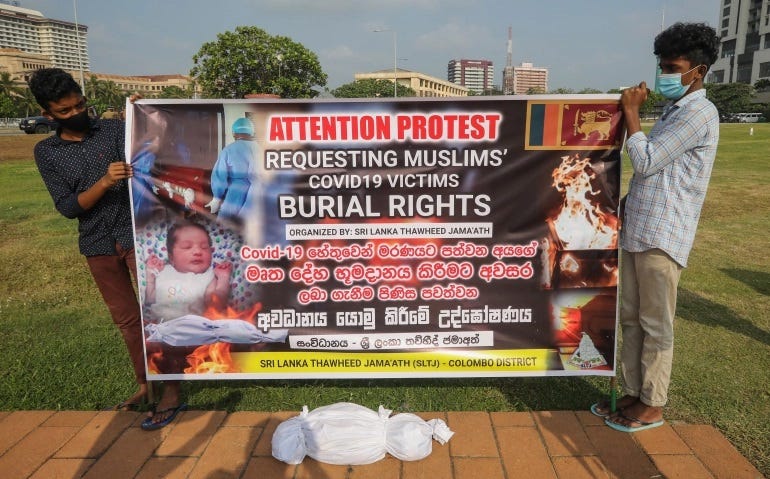MPAC Welcomes Sri Lanka’s Reversal of Forced Cremation Policy and Urges Codification
By: MPAC D.C. Bureau

On Wednesday, February 10, following immense international condemnation, Sri Lanka Prime Minister Mahinda Rajapaksa, while answering a question by Muslim lawmaker Rishard Bathiudeen, indicated that his government will grant permission for Muslims who have died of the COVID-19 virus to be buried. This marks a clear victory for international religious freedom, a key issue in MPAC’s advocacy. Through our engagement with the U.S. Legislature, Department of State, and civil society stakeholders, MPAC joined allies Imam Malik Mujahid (Justice For All) and CAIR National in advocating for international religious freedom, human rights, and fair treatment of Muslims in Sri Lanka.
What was the issue?
Since March 2020, the Sri Lankan government instituted forced cremations for all victims of the COVID-19 virus, claiming that burials would allow the virus to contaminate underground water. The World Health Organization (WHO) in fact found that there is no need to cremate bodies as a measure against the spread of the virus. Forced cremation is in clear breach of the faith traditions of Sri Lanka’s Muslim and Christian populations. Human Rights Watch, the United Nations, and Amnesty International joined a multitude of international organizations, religious leaders, and health professionals in highlighting the policy as a clear violation of human rights. Sri Lankan Health Minister Pavithra Wanniarachchi rejected global calls to revoke the forced cremations policy.
What does this mean for the Biden Administration?
Recent actions signal that the Biden Administration is reengaging our nation’s foreign policy on international religious freedom and human rights. U.S. Ambassador to Sri Lanka, Ms. Alaina Teplitz, stated “implementation of a revised practice that is in line with international public health norms and respects religious rites is a positive action.” Furthermore, just this past week, Saudi Arabia released Loujain al-Hathloul, a prominent Saudi women’s rights defender, which was hailed by President Biden as “the right thing to do.” Since taking office, the Biden Administration announced its plan for launching an interagency review to determine whether Myanmar’s persecution of its Muslim Rohingya minority amounts to genocide and announced that the administration will continue former Secretary of State Pompeo’s designation that China committed genocide against its Muslim Uyghur population. We commend the Biden Administration’s recent actions to pressure nations around the world that are suppressing religious liberty and human rights.
There’s still more work to be done
Though we are encouraged by this positive news in Rajapaksa’s position on Muslim burial rights, we look forward to a fully codified reversal of Sri Lanka’s forced cremation policy. There are ongoing efforts advocating the Human Rights Council to establish an accountability mechanism for Sri Lanka’s victims. MPAC, since its inception, has and will continue to champion religious freedom, human rights, and the rights of minorities as core principles of Muslim and American values.